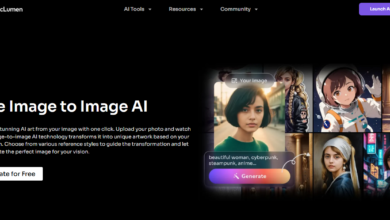Future Smart City: How Technology is Shaping Tomorrow’s Urban Living

The concept of a future smart city is no longer a distant dream but a rapidly unfolding reality. As urbanization accelerates, cities worldwide are embracing cutting-edge technologies to improve efficiency, sustainability, and quality of life. From AI-powered infrastructure to data-driven decision-making, smart cities are revolutionizing the way we interact with urban spaces.
One of the most transformative aspects of this shift is the rise of AI virtual agents that streamline city operations, assist residents with real-time information, and improve public services. These intelligent systems enhance communication between citizens and governments, making smart cities more responsive, connected, and efficient.
In this article, we’ll explore how smart cities function, the latest trends shaping their future, and the top locations leading this technological revolution. We’ll also answer key questions about this transformative urban vision and its impact on daily life.
What is a Smart City?
A smart city utilizes digital technologies and data analytics to optimize city operations, improve services, and promote sustainable development. The main objectives include enhancing transportation systems, reducing energy consumption, and improving public safety. By implementing sensors and IoT devices, cities can monitor and manage resources effectively, leading to better decision-making and service delivery.
How Does a Smart City Work?
Smart cities rely on interconnected systems to collect and analyze data in real time. For example, IoT sensors monitor traffic flow and adjust signals to reduce congestion. AI-powered systems predict energy demand and optimize grid usage. And smart waste management uses sensors to schedule pickups only when bins are full.
Top 15 Smart Cities Leading the Future of Urban Innovation
Several cities worldwide have embraced smart city initiatives, setting benchmarks for others:
- Singapore: Developed “Virtual Singapore,” a digital twin model to simulate and optimize urban planning and disaster management.
- Copenhagen, Denmark: Recognized for its “Connecting Copenhagen” strategy, focusing on sustainable urban development and citizen engagement.
- Stockholm, Sweden: Implemented the Stokab dark fiber system, providing a universal fiber optic network to support various smart city applications.
- Tokyo, Japan: Integrated AI-driven solutions for smart transportation, disaster preparedness, and energy-efficient urban development.
- Barcelona, Spain: Adopted 5G technology, IoT-based public services, and automated waste collection to enhance urban sustainability.
- Amsterdam, Netherlands: Pioneered the “Amsterdam Smart City” initiative, promoting smart mobility, self-driving boats, and digital infrastructure.
- Helsinki, Finland: Developed digital twin technology to optimize city planning and AI-based sustainability efforts.
- Dubai, UAE: Aims to become the world’s first blockchain-powered government, integrating AI-driven transport and digital public services.
- New York City, USA: Uses sensor networks and AI analytics for real-time traffic management, public safety, and smart waste solutions.
- Seoul, South Korea: A leader in 5G connectivity and AI-powered smart mobility, with an advanced digital governance framework.
- Toronto, Canada: Developed Sidewalk Labs’ smart district, featuring AI-powered urban planning and energy-efficient infrastructure.
- Hong Kong, China: Implements IoT, AI, and big data to optimize public transport, digital security, and smart energy grids.
- Vienna, Austria: Focuses on smart building technologies, energy-efficient housing, and autonomous public transport systems.
- Berlin, Germany: A hub for urban tech startups, AI-driven public services, and smart metering for sustainable energy use.
- Los Angeles, USA: Uses predictive AI technology to optimize traffic control, emergency response, and urban sustainability efforts.
Future Smart City
The future smart city envisions an urban environment where technology seamlessly integrates with daily life, promoting sustainability, efficiency, and enhanced quality of life.
Future Smart City Trends
Emerging trends shaping the development of future smart cities include:
- Artificial Intelligence (AI): Utilizing AI for predictive analytics in traffic management, energy consumption, and public safety.
- Internet of Things (IoT): Connecting devices and infrastructure to collect and analyze data for informed decision-making.
- Sustainable Energy Solutions: Adopting renewable energy sources and smart grids to reduce carbon footprints.
- Citizen Engagement Platforms: Encouraging public participation through digital platforms for feedback and collaboration.
Future Smart City Locations
Projects like Woven City in Japan, The Line in Saudi Arabia, and Sonderborg in Denmark are examples of planned smart cities.
- Woven City, Japan: Toyota’s project near Mount Fuji serves as a living laboratory for testing autonomous vehicles, robotics, and smart homes.
- The Line, Saudi Arabia: Part of the NEOM project, this linear city aims to revolutionize urban living with zero cars and carbon emissions.
- Sonderborg, Denmark: Aiming for carbon neutrality by 2029 through the “Project Zero” initiative, focusing on energy efficiency and sustainability.
Future Smart City Concept
The future smart city concept envisions urban areas that leverage advanced technology to create efficient, sustainable, and livable environments. These cities aim to improve quality of life by integrating intelligent infrastructure, data-driven decision-making, and eco-friendly innovations.
- Sustainable: Future smart cities prioritize environmental sustainability by incorporating renewable energy sources, energy-efficient buildings, and eco-friendly transportation systems. Technologies like smart grids, solar power, and automated waste management help reduce carbon footprints and promote greener living.
- Connected: A future smart city ensures seamless connectivity between residents, government agencies, and infrastructure through the Internet of Things (IoT), AI-driven communication systems, AI virtual agents, and high-speed 5G networks. This enables real-time data collection and analysis for traffic management, public safety, and efficient city services.
- Resilience: Urban resilience is a core feature of future smart cities, equipping them to adapt to environmental, economic, and social challenges. Climate-resistant infrastructure, disaster management systems, and predictive analytics help mitigate risks related to climate change, natural disasters, and rapid population growth.
By integrating these principles, the future smart city is set to revolutionize urban living, making cities more intelligent, sustainable, and adaptable to future challenges.
FAQ about Future Smart City
Do smart cities already exist?
Yes, several cities worldwide have implemented smart city initiatives, integrating technology to improve urban living.
What is the number one smart city in the world?
Rankings vary, but cities like Singapore and Copenhagen are often cited among the top smart cities globally.
Is the smart city part of AI?
While not solely based on AI, smart cities leverage AI technologies for various applications, including data analysis and automation.
Where is Bill Gates building a smart city?
Bill Gates has invested in a planned smart city in Arizona, USA, aiming to incorporate advanced technologies and sustainable practices.
Who is the father of smart city?
There isn’t a single “father” of smart cities; the concept has evolved through contributions from various urban planners, technologists, and policymakers.
Are smart cities safer?
Smart cities aim to enhance safety through technologies like surveillance systems, emergency response optimization, and predictive analytics.




